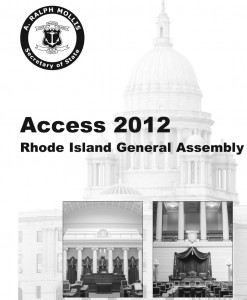 The ACLU of Rhode Island filed a Freedom of Information Act (FOIA) lawsuit Wednesday on behalf of local journalist, Philip Eil, who has been stymied for more than three years in his effort to obtain access to thousands of pages of public evidence from a major prescription drug-dealing trial.
The ACLU of Rhode Island filed a Freedom of Information Act (FOIA) lawsuit Wednesday on behalf of local journalist, Philip Eil, who has been stymied for more than three years in his effort to obtain access to thousands of pages of public evidence from a major prescription drug-dealing trial.
The lawsuit, against the Drug Enforcement Administration (DEA), seeks a court order to release the documents, a declaration that the DEA has wrongfully withheld and redacted documents, and an award of attorney fees. Filing the suit were ACLU volunteer attorneys Neal McNamara and Jessica Jewell, from the law firm of Nixon Peabody.
The request in question involves the evidence used to convict Dr. Paul Volkman, whom the Department of Justice has called the “largest physician dispenser of oxycodone in the United States from 2003 to 2005.” Volkman was indicted on 22 drug trafficking-related counts in 2007, and, in 2011, after an eight-week federal court trial in Ohio that included 70 witnesses and more than 220 exhibits, he was convicted of, among other charges, prescribing medications that caused the overdose deaths of four patients. In 2012, Volkman was sentenced to four consecutive life terms in federal prison — one of the lengthiest criminal sentences for a physician in U.S. history.
Volkman attended college and medical school with Eil’s father, and, in 2009, Eil began conducting research and reporting for a book about the case. After Volkman’s trial ended, Eil requested access to the trial evidence from the clerk of the U.S. District Court in Cincinnati. This request was denied, as were Eil’s subsequent requests to the Ohio U.S. Attorney’s office, the U.S. District Court judge who presided over the case, and the clerk of the 6th Circuit U.S. Court of Appeals.
On February 1, 2012, Eil filed a FOIA request with the Executive Office of U.S. Attorneys, which eventually transferred the request to the DEA nine months later. The DEA still has not completely fulfilled the request, despite numerous efforts by Eil to expedite a response. Pending with the DEA for more than 800 days, Eil’s request is eight months older than what the federal government-operated website, FOIA.gov, reports as the agency’s longest pending request.

One of the 133 slides released to Mr. Eil. The substance of nearly every slide was redacted.
In addition to the time it has taken to process the request, the DEA has withheld 87 percent of the 12,724 pages it has thus far processed for Eil’s FOIA request, and stripped most of the substantive information from the remaining 1,600 pages it has “released.” For example, as the lawsuit notes, one of the nine installments of releases to Eil included “a 133-page slide show where the substance from nearly every single slide is redacted.” In another one of the “partial releases” of information, the DEA withheld 1,225 of 1,232 pages it processed.
“You can’t have a true democracy without a transparent court system, and this case represents an egregious failure of judicial transparency,” Eil said. “The right to a public trial is a basic tenet of our society, and it’s scary to think that any trial in the United States, especially one of this magnitude, would be retroactively sealed off from public view, as this case has.”
All too often at both the state and federal level, agencies address the public’s right to know as they would an exceedingly unpleasant chore – reluctantly, with some disdain, and with little care for the finished product – instead of as the fundamental and essential engine of democracy that it is. Mr. Eil’s efforts and this lawsuit are a reminder of the importance of persistence in holding government agencies accountable to the public.
Eil is an award-winning freelance journalist who, most recently, was news editor and staff writer of the Providence Phoenix until the paper’s closing in 2014. He has taught classes on writing and journalism at the Rhode Island School of Design, where he will return as an adjunct lecturer in September. He has conducted more than 100 interviews, across 19 states, for his book about the Volkman case.
The DEA’s actions in Eil’s case follow a disturbing pattern of FOIA-related behavior from the agency in recent years. In 2012, reason.com reported that DEA FOIA rejections had increased 114 percent since 2008, and earlier this year, the agency told a FOIA requester it would cost $1.4 million to process his request.
The lawsuit was filed in the middle of Sunshine Week, a week designated to educate the public about the importance of open government.






